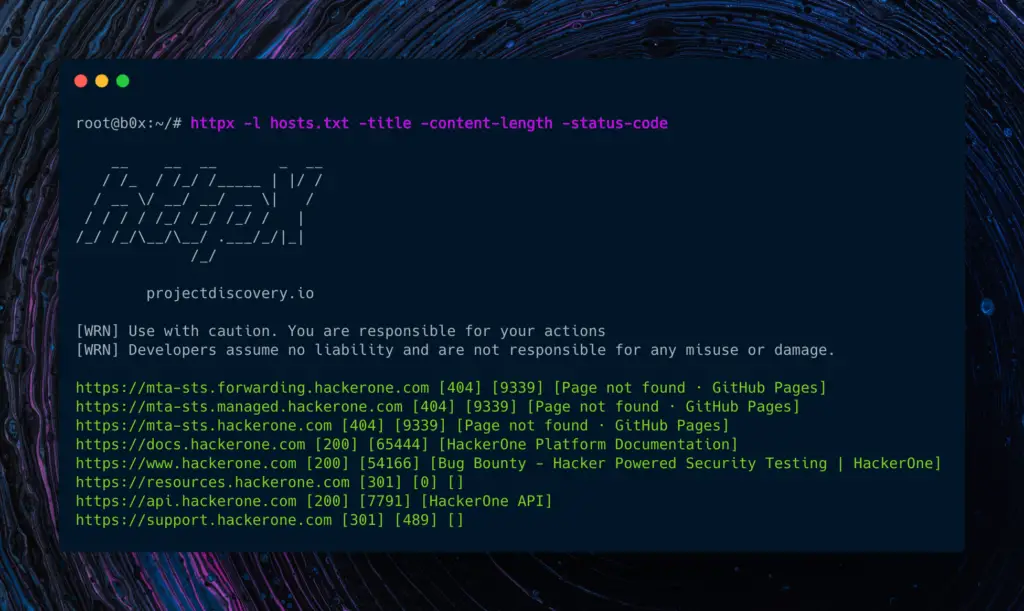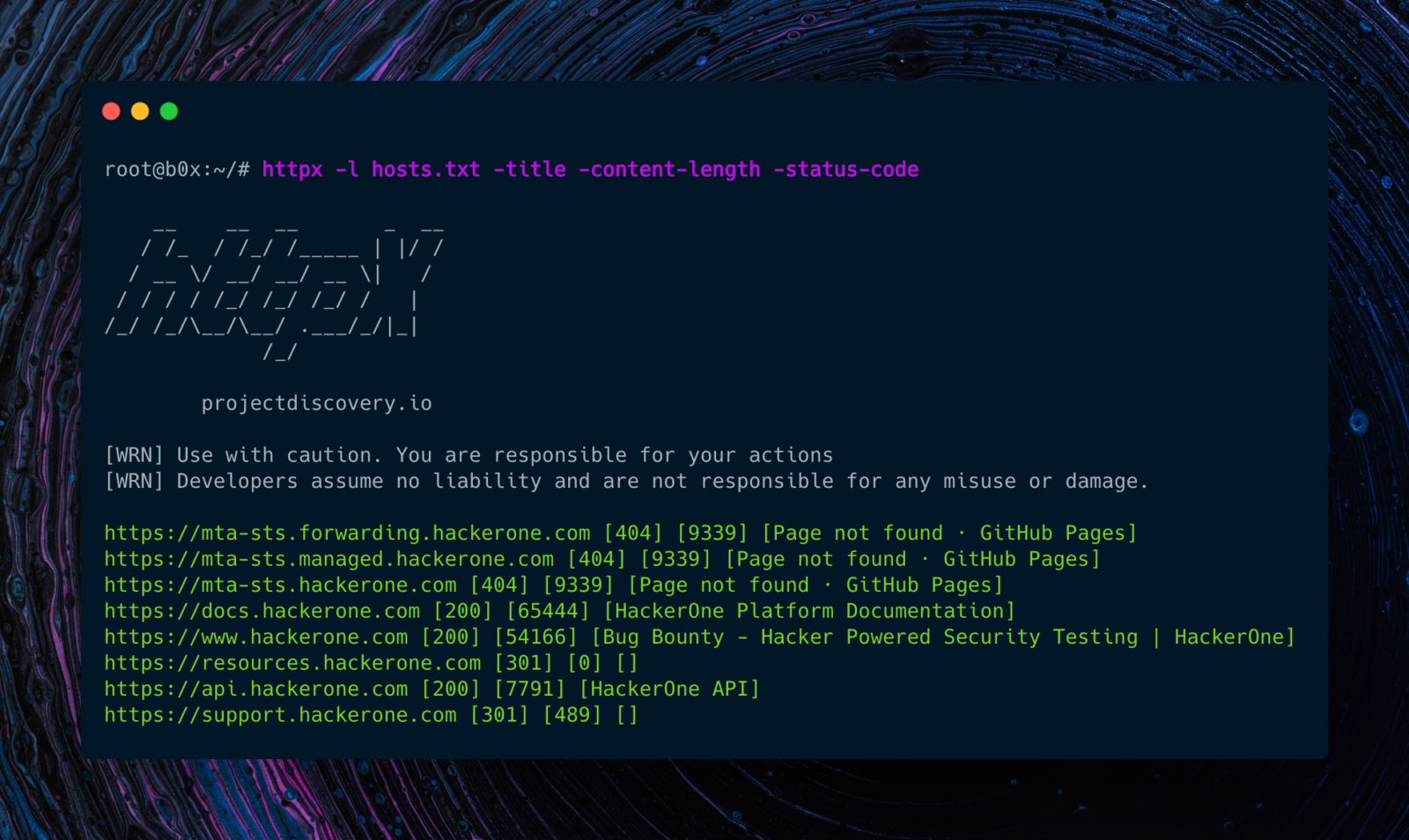

httpx is a fast and multi-purpose HTTP toolkit allow to run multiple probers using retryablehttp library, it is designed to maintain the result reliability with increased threads.
Resources
- Resources
- Features
- Usage
- Installation Instructions
- Running httpx with stdin
- Running httpx with file input
- Running httpx with CIDR input
- Running httpX with subfinder
- Notes
- Thanks
Features

- Simple and modular code base making it easy to contribute.
- Fast And fully configurable flags to probe mutiple elements.
- Supports multiple HTTP based probings.
- Smart auto fallback from https to http as default.
- Supports hosts, URLs and CIDR as input.
- Handles edge cases doing retries, backoffs etc for handling WAFs.
Supported probes:-
| Probes | Default check | Probes | Default check |
|---|---|---|---|
| URL | true | IP | true |
| Title | true | CNAME | true |
| Status Code | true | Raw HTTP | false |
| Content Length | true | HTTP2 | false |
| TLS Certificate | true | HTTP 1.1 Pipeline | false |
| CSP Header | true | Virtual host | false |
| Location Header | true | CDN | false |
| Web Server | true | Path | false |
| Web Socket | true | Ports | false |
| Response Time | true | Request method | false |
Installation Instructions
From Binary
The installation is easy. You can download the pre-built binaries for your platform from the Releases page. Extract them using tar, move it to your $PATHand you’re ready to go.
Download latest binary from https://github.com/projectdiscovery/httpx/releases
▶ tar -xvf httpx-linux-amd64.tar
▶ mv httpx-linux-amd64 /usr/local/bin/httpx
▶ httpx -h
From Source
httpx requires go1.14+ to install successfully. Run the following command to get the repo –
▶ GO111MODULE=on go get -v github.com/projectdiscovery/httpx/cmd/httpx
From Github
▶ git clone https://github.com/projectdiscovery/httpx.git; cd httpx/cmd/httpx; go build; mv httpx /usr/local/bin/; httpx -version
Usage
httpx -h
This will display help for the tool. Here are all the switches it supports.
| Flag | Description | Example |
|---|---|---|
| H | Custom Header input | httpx -H ‘x-bug-bounty: hacker’ |
| follow-redirects | Follow URL redirects (default false) | httpx -follow-redirects |
| follow-host-redirects | Follow URL redirects only on same host(default false) | httpx -follow-host-redirects |
| http-proxy | URL of the proxy server | httpx -http-proxy hxxp://proxy-host:80 |
| l | File containing HOST/URLs/CIDR to process | httpx -l hosts.txt |
| no-color | Disable colors in the output. | httpx -no-color |
| o | File to save output result (optional) | httpx -o output.txt |
| json | Prints all the probes in JSON format (default false) | httpx -json |
| vhost | Probes to detect vhost from list of subdomains | httpx -vhost |
| threads | Number of threads (default 50) | httpx -threads 100 |
| http2 | HTTP2 probing | httpx -http2 |
| pipeline | HTTP1.1 Pipeline probing | httpx -pipeline |
| ports | Ports ranges to probe (nmap syntax: eg 1,2-10,11) | httpx -ports 80,443,100-200 |
| title | Prints title of page if available | httpx -title |
| path | Request path/file | httpx -path /api |
| content-length | Prints content length in the output | httpx -content-length |
| ml | Match content length in the output | httpx -content-length -ml 125 |
| fl | Filter content length in the output | httpx -content-length -fl 0,43 |
| status-code | Prints status code in the output | httpx -status-code |
| mc | Match status code in the output | httpx -status-code -mc 200,302 |
| fc | Filter status code in the output | httpx -status-code -fc 404,500 |
| tls-probe | Send HTTP probes on the extracted TLS domains | httpx -tls-probe |
| content-type | Prints content-type | httpx -content-type |
| location | Prints location header | httpx -location |
| csp-probe | Send HTTP probes on the extracted CSP domains | httpx -csp-probe |
| web-server | Prints running web sever if available | httpx -web-server |
| sr | Store responses to file (default false) | httpx -sr |
| srd | Directory to store response (optional) | httpx -srd httpx-output |
| unsafe | Send raw requests skipping golang normalization | httpx -unsafe |
| request | File containing raw request to process | httpx -request |
| retries | Number of retries | httpx -retries |
| silent | Prints only results in the output | httpx -silent |
| stats | Prints statistic every 5 seconds | httpx -stats |
| timeout | Timeout in seconds (default 5) | httpx -timeout 10 |
| verbose | Verbose Mode | httpx -verbose |
| version | Prints current version of the httpx | httpx -version |
| x | Request Method (default ‘GET’) | httpx -x HEAD |
| method | Output requested method | httpx -method |
| response-time | Output the response time | httpx -response-time |
| response-in-json | Include response in stdout (only works with -json) | httpx -response-in-json |
| websocket | Prints if a websocket is exposed | httpx -websocket |
| ip | Prints the host IP | httpx -ip |
| cname | Prints the cname record if available | httpx -cname |
| cdn | Check if domain’s ip belongs to known CDN | httpx -cdn |
| filter-string | Filter results based on filtered string | httpx -filter-string XXX |
| match-string | Filter results based on matched string | httpx -match-string XXX |
| filter-regex | Filter results based on filtered regex | httpx -filter-regex XXX |
| match-regex | Filter results based on matched regex | httpx -match-regex XXX |
Running httpx with stdin
This will run the tool against all the hosts and subdomains in hosts.txt and returns URLs running HTTP webserver.
▶ cat hosts.txt | httpx
__ __ __ _ __
/ /_ / /_/ /_____ | |/ /
/ __ \/ __/ __/ __ \| /
/ / / / /_/ /_/ /_/ / |
/_/ /_/\__/\__/ .___/_/|_| v1.0
/_/
projectdiscovery.io
[WRN] Use with caution. You are responsible for your actions
[WRN] Developers assume no liability and are not responsible for any misuse or damage.
https://mta-sts.managed.hackerone.com
https://mta-sts.hackerone.com
https://mta-sts.forwarding.hackerone.com
https://docs.hackerone.com
https://www.hackerone.com
https://resources.hackerone.com
https://api.hackerone.com
https://support.hackerone.com
Running httpx with file input
This will run the tool against all the hosts and subdomains in hosts.txt and returns URLs running HTTP webserver.
▶ httpx -l hosts.txt -silent https://docs.hackerone.com https://mta-sts.hackerone.com https://mta-sts.managed.hackerone.com https://mta-sts.forwarding.hackerone.com https://www.hackerone.com https://resources.hackerone.com https://api.hackerone.com https://support.hackerone.com
Running httpx with CIDR input
▶ echo 173.0.84.0/24 | httpx -silent https://173.0.84.29 https://173.0.84.43 https://173.0.84.31 https://173.0.84.44 https://173.0.84.12 https://173.0.84.4 https://173.0.84.36 https://173.0.84.45 https://173.0.84.14 https://173.0.84.25 https://173.0.84.46 https://173.0.84.24 https://173.0.84.32 https://173.0.84.9 https://173.0.84.13 https://173.0.84.6 https://173.0.84.16 https://173.0.84.34
Running httpx with subfinder
▶ subfinder -d hackerone.com -silent | httpx -title -content-length -status-code -silent https://mta-sts.forwarding.hackerone.com [404] [9339] [Page not found · GitHub Pages] https://mta-sts.hackerone.com [404] [9339] [Page not found · GitHub Pages] https://mta-sts.managed.hackerone.com [404] [9339] [Page not found · GitHub Pages] https://docs.hackerone.com [200] [65444] [HackerOne Platform Documentation] https://www.hackerone.com [200] [54166] [Bug Bounty - Hacker Powered Security Testing | HackerOne] https://support.hackerone.com [301] [489] [] https://api.hackerone.com [200] [7791] [HackerOne API] https://hackerone.com [301] [92] [] https://resources.hackerone.com [301] [0] []
Notes
- As default, httpx checks for
HTTPSprobe and fall-back toHTTPonly ifHTTPSis not reachable. - For printing both HTTP/HTTPS results,
no-fallbackflag can be used. - Custom scheme for ports can be defined, for example
-ports http:443,http:80,https:8443 vhost,http2,pipeline,ports,csp-probe,tls-probeandpathare unique flag with different probes.- Unique flags should be used for specific use cases instead of running them as default with other flags.
- When using
jsonflag, all the information (default probes) included in the JSON output.
Thanks
httpx is made with ![]() by the projectdiscovery team. Community contributions have made the project what it is. See the Thanks.md file for more details. Do also check out these similar awesome projects that may fit in your workflow:
by the projectdiscovery team. Community contributions have made the project what it is. See the Thanks.md file for more details. Do also check out these similar awesome projects that may fit in your workflow:
Probing feature is inspired by @tomnomnom/httprobe work

























Leave a Reply